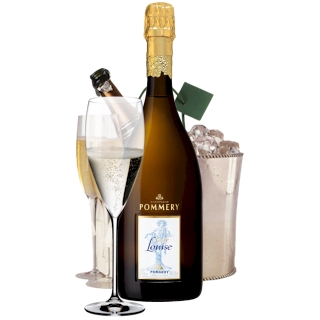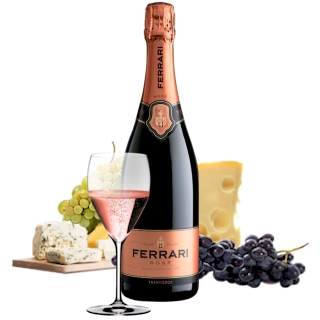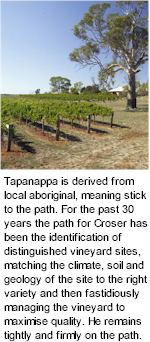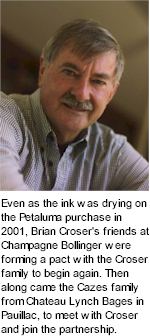


Then along came the Cazes family from Chateau Lynch Bages in Pauillac. On a trip to Australia in 2002, Jean-Michel and his son Jean-Charles met with Croser and joined the partnership. The driving ambition was to own and make wine from the more than 30-year old Koppamurra Vineyard just north of Coonawarra. Tapanappa was born and Koppamurra Vineyard was acquired in late 2002. The property has since been renamed Whalebone Vineyard. The partnership was founded in a strong, mutually held belief that some pieces of ground are much better than others for the production of fine wine. Of course this superiority is highly specific to varieties and wine style. The Whalebone Vineyard and Cabernet Sauvignon in particular have a unique synergy. Croser learned of the wonderful quality of Cabernet from the Whalebone Vineyard 25 years ago when in 1980, he assisted Geoff Weaver to make his very first wine from this vineyard under the Ashbourne label.

Tapanappa is also fortunate to have access to Chardonnay fruit from The Tiers Vineyard, planted by the Croser family in 1979, the first vineyard planted in the Adelaide Hills since the 19th century and a proven distinguished site for Chardonnay. This is the concept of terroir, the uncopyable effect of the geology, soil, climate, latitude, longitude, altitude, aspect, surrounds and all other factors affecting Cabernet vines on the Whalebone Vineyard and Chardonnay on The Tiers. Whalebone and Tiers are proven distinguished sites. In the middle of and at the highest point of the Fleurieu Peninsula, the Croser family have planted a revolutionary Pinot Noir vineyard 10 kilometres from any other site, a distinguished site in the making. The mission of Tapanappa is to maximise the quality of wine from these three distinguished sites, regardless of cost, which also implies producing only tiny quantities of wine.
Traditional South Australian viticulturists considered the Piccadilly Valley too cool and inclement for grape growing and The Tiers Vineyard configuration too expensive to establish and too costly to manage for an economic return. Their scepticism was nearly justified when the first flowerings of the new Tiers Vineyard failed in 1983 and 1984 because of what later proved to be unusually windy and cold weather in late November of both years. Tiers was the first of the now many cool climate vineyards later established to this formula in Australia in the 1980’s and 1990’s.
The Croser family commitment to the continued excellence of the Chardonnay fruit from The Tiers Vineyard has been demonstrated by the emotionally painful removal of one third of the original panting and its replacement by new Dijon Chardonnay clones on rootstocks and on an even tighter planting regime of 4444 vines/hectare. These vines now contribute another layer of complexity to Tapanappa Tiers Chardonnay.

When the Croser family purchased Maylands Farm at Parawa on the Southern Fleurieu peninsula in 2003, they did so with the sole purpose of growing the finest sea air and grass fed prime lambs. Despite all the best intentions, Croser quickly developed a sense that there were some ideal viticultural sites at Maylands. By Christmas, Foggy Hill stage one had been planted on rootstocks with the Dijon University (Bernard) Pinot Noir clones 114, 115 and 777. Maylands Farm lambs graze in the paddocks alongside the Foggy Hill Vineyard in the cool humid air from the Great Southern Ocean visible to the south.
Whalebone may be special but the important question is, what is so special about the wine? Whalebone Cabernet Shiraz shows a consistency of style and quality that transcends vintage variation. The wine is recognisably Whalebone from hotter or colder, wetter or drier vintages. First and foremost Tapanappa Cabernet Shiraz is the taste of the Whalebone Vineyard. The terroir delivers complexity involving the aroma and flavour of dusty earth and Eucalypt smoke. Whalebone Cabernet Shiraz shines with a translucent cerise and purple hue. The aroma is complex and powerful, dominated by ripe blackberry and plum fruit. Liquorice, cellar earth, clove and leather are layered on the foundation of fruit aroma. A finely textured palate with a sweet fruit core and dry grainy tannin finish are hallmarks of a wine of pedigree. Tapanappa Whalebone Vineyard Cabernet Shiraz is grown and made to benefit from bottle age.
The word Tapanappa is probably derived from local aboriginal meaning stick to the path. For the past 30 years the path for Croser has been the identification of distinguished vineyard sites, matching the climate, soil and geology of the site to the right variety and then fastidiously managing the vineyard to maximise quality. That is the philosophy on which Croser founded Petaluma. With Tapanappa, he remains firmly on the path.
